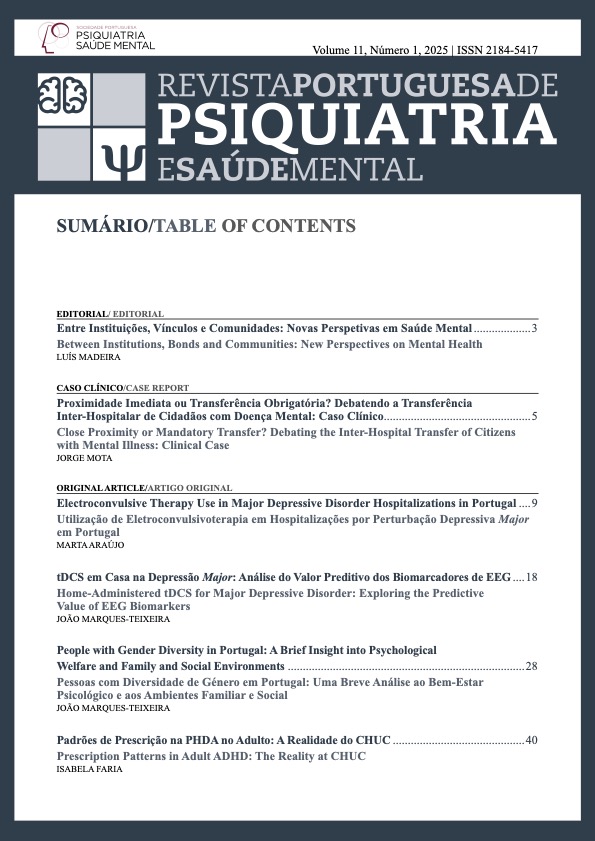Patients with Schizophrenia who Attended a Partial Hospitalization Program of Psychiatry at Médio Tejo Hospital Center: A Descriptive Study
DOI:
https://doi.org/10.51338/rppsm.470Keywords:
Schizophrenia, Day Care, Medical, Psychopharmacology, Psychiatric Rehabilitation, Mental Health ServicesAbstract
Introduction: The aim is to evaluate a clinical series of patients with schizophrenia who attended a Partial Hospitalization Program of Psychiatry, in order to understand what challenges these patients pose to us in terms of their treatment, relapse prevention and social reintegration.Methods: We analyzed a cohort of patients diagnosed with schizophrenia, who attended the Partial Hospitalization Program at a Department of Psychiatry, between the years 2016 and 2020. Data was extracted regarding sociodemographic characterization, attendance of the program, pharmacological treatment, comorbidities, readmissions to the acute ward, post‑discharge social responses and presence of psychotic symptoms.
Results: Thirty three patients were included. Most of them were male (66.67%), with an average age of 35.09 years, mostly coming from Tomar (51.52%) and living with their parents and/or siblings (75.76%). 42.42% were initially unemployed. Patients attended partial hospitalization for an average of 68.71 months. Regarding pharmacological treatment, clozapine established itself as the most common oral antipsychotic and paliperidone as the most common injectable antipsychotic. The average number of antipsychotic medications per patient increased over time accompanied by a significant increase in injectable antipsychotic medications, and a slight decrease in the number of oral antipsychotics. There is also a decrease in the utilization of benzodiazepines, but the utilization of medications to treat extrapyramidal and depressive symptoms remains high. The most frequent medical comorbidity after discharge is overweight/obesity in 30.3% of cases. Acute ward admissions dropped significantly. Regarding post‑discharge social responses, unemployment declined significantly; protected jobs and disability pensions increased significantly. Regarding psychotic symptoms, the number of patients presenting with negative and cognitive symptoms remained high at discharge from the program.
Conclusion: The Partial Hospitalization Program seems to translate in the long term into a smaller number of readmissions in the acute ward. It also contributes to improving the social reintegration of the patients. However, the stability of these patients is mostly achieved through a high cumulative dose of antipsychotic medication. These patients present with significant medical comorbidities and a progressive increase in polypharmacy throughout the years, showing us that we still have a long way to go when it comes to treating patients with schizophrenia.
Downloads
References
- Jauhar S, Johnstone M, McKenna PJ. Schizophrenia. Lancet. 2022 Jan 29;399(10323):473-486. doi: 10.1016/S0140-6736(21)01730-X. PMID: 35093231.
- Liu N., Daumit G., Dua T., Aquila R., Charlson F., Cuijpers P., Druss B., Dudek K., Freeman M., Fujii C., et al. Excess mortality in persons with severe mental disorders: A multilevel intervention framework and priorities for clinical practice, policy and research agendas. World Psychiatry. 2017;16:30–40. doi: 10.1002/wps.20384.
- Laursen TM. Life expectancy among persons with schizophrenia or bipolar affective disorder. Schizophr Res. 2011 Sep;131(1-3):101-4. doi: 10.1016/j.schres.2011.06.008. Epub 2011 Jul 7. PMID: 21741216.
- Disorders: Recent Advances in Understanding and Management. Healthcare (Basel). 2022 Nov 25;10(12):2366. doi: 10.3390/healthcare10122366. PMID: 36553890; PMCID: PMC9777663.
- Correll C.U., Solmi M., Croatto G., Schneider L.K., Rohani-Montez S.C., Fairley L., Smith N., Bitter I., Gorwood P., Taipale H., et al. Mortality in people with schizophrenia: A systematic review and meta-analysis of relative risk and aggravating or attenuating factors. World Psychiatry. 2022;21:248–271. doi: 10.1002/wps.20994.
- Shek E, Stein AT, Shansis FM, Marshall M, Crowther R, Tyrer P. Day hospital versus outpatient care for people with schizophrenia. Cochrane Database Syst Rev. 2009 Oct 7;2009(4):CD003240. doi: 10.1002/14651858.CD003240.pub2. PMID: 19821303; PMCID: PMC7003561.
- Marshall M, Crowther R, Sledge WH, Rathbone J, Soares-Weiser K. Day hospital versus admission for acute psychiatric disorders. Cochrane Database Syst Rev. 2011 Dec 7;2011(12):CD004026. doi: 10.1002/14651858.CD004026.pub2. PMID: 22161384; PMCID: PMC4160006.
- Moritz S, Menon M, Balzan R, Woodward TS. Metacognitive training for psychosis (MCT): past, present, and future. Eur Arch Psychiatry Clin Neurosci. 2022 Mar 25:1–7. doi: 10.1007/s00406-022-01394-9. Epub ahead of print. PMID: 35338378; PMCID: PMC8956140.
- Northwood K, Theodoros T, Wang N, Siskind D. High-dose antipsychotic therapy and reflective prescribing: development of an online tool for rapid, easy calculation of antipsychotic total daily dose. Australas Psychiatry. 2020 Aug;28(4):410-413. doi: 10.1177/1039856220917080. Epub 2020 May 11. PMID: 32391726.
- Hajj A, Obeid S, Sahyoun S, Haddad C, Azar J, Rabbaa Khabbaz L, Hallit S. Clinical and Genetic Factors Associated with Resistance to Treatment in Patients with Schizophrenia: A Case-Control Study. Int J Mol Sci. 2019 Sep 25;20(19):4753. doi: 10.3390/ijms20194753. PMID: 31557839; PMCID: PMC6801865.
- Maestri TJ, Mican LM, Rozea H, Barner JC. Do Long-Acting Injectable Antipsychotics Prevent or Delay Hospital Readmission? Psychopharmacol Bull. 2018 Mar 13;48(3):8-15. PMID: 29713100; PMCID: PMC5875369.
Bighelli I, Rodolico A, García‑Mieres H, Pitschel‑Walz G, Hansen WP, Schneider ‑Thoma J, et al. Psychosocial and psychological interventions for relapse prevention in schizophrenia: a systematic review and network meta ‑analysis. Lancet Psychiatry. 2021;8:969 ‑80. doi: 10.1016/S2215 ‑0366(21)00243 ‑1.
- Tiihonen J, Taipale H, Mehtälä J, Vattulainen P, Correll CU, Tanskanen A. Association of Antipsychotic Polypharmacy vs Monotherapy With Psychiatric Rehospitalization Among Adults With Schizophrenia. JAMA Psychiatry. 2019;76(5):499–507. doi:10.1001/jamapsychiatry.2018.4320.
- Hjorth S (2021) The More, the Merrier…? Antipsychotic Polypharmacy Treatment Strategies in Schizophrenia From a Pharmacology Perspective. Front. Psychiatry 12:760181. doi: 10.3389/fpsyt.2021.760181.
- Kanahara N, Yamanaka H, Shiko Y, Kawasaki Y, Iyo M. The effects of cumulative antipsychotic dose on brain structures in patients with schizophrenia: Observational study of multiple CT scans over a long-term clinical course. Psychiatry Res Neuroimaging. 2022 Jan;319:111422. doi: 10.1016/j.pscychresns.2021.111422. Epub 2021 Nov 26. PMID: 34856453.
- Ijaz S, Bolea B, Davies S, Savović J, Richards A, Sullivan S, Moran P. Antipsychotic polypharmacy and metabolic syndrome in schizophrenia: a review of systematic reviews. BMC Psychiatry. 2018 Sep 3;18(1):275. doi: 10.1186/s12888-018-1848-y. PMID: 30176844; PMCID: PMC6122457.
- Mitchell AJ, Vancampfort D, Sweers K, van Winkel R, Yu W, De Hert M. Prevalence of metabolic syndrome and metabolic abnormalities in schizophrenia and related disorders--a systematic review and meta-analysis. Schizophr Bull. 2013 Mar;39(2):306-18. doi: 10.1093/schbul/sbr148. Epub 2011 Dec 29. PMID: 22207632; PMCID: PMC3576174.
- Na EY, Lim YJ. Influence of Employment on the Positive Mental Health of Individuals with Schizophrenia Living in the Community. Psychiatr Q. 2020 Mar;91(1):203-208. doi: 10.1007/s11126-019-09686-5. PMID: 31811582.
Cella M, Preti A, Edwards C, Dow T, Wykes T. Cognitive remediation for negative symptoms of schizophrenia: A network meta ‑analysis. Clin Psychol Rev. 2017; 52:43 ‑51. doi: 10.1016/j.cpr.2016.11.009.
Barlati S, Deste G, De Peri L, Ariu C, Vita A. Cognitive remediation in schizophrenia: current status and future perspectives. Schizophr Res Treatment. 2013;2013:156084. doi: 10.1155/2013/156084








